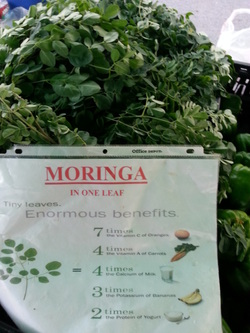
I’ve since learned that Moringa leaves have many health benefits because they are a rich source of a wide variety of nutrients, including antioxidants, vitamin C, vitamin A, protein, calcium, iron, and potassium. In fact, Moringa leaves are very unusual because they contain such a wide variety of nutrients in such high amounts within a single plant. Moringa leaves are an excellent source of plant protein because they contain 18 of the 20 amino acids our bodies need, including all nine essential amino acids (those amino acids our bodies cannot make and therefore we must get from foods we eat), and the protein in Moringa appears to be easier for our bodies to digest and assimilate than other proteins such as soy protein. Moringa trees do well in hot, dry areas, and many cultures, especially in hot climates in Africa and South Asia, use Moringa leaves as a remedy and multivitamin! Children at a clinic in Senegal (West Africa) were healthier, happier, more energetic, and smiling only three weeks after ingesting one teaspoon of dried Moringa leaves three times daily (check out the Discovery Channel YouTube video link below). Monica G. Marcu, author of Miracle Tree, even stated that Moringa is very close to being a perfect source of nutrients in terms of variety and concentration.
I was curious about the claims I found on the sheet at the Farmers Market (shown in the photo above), so I went to the USDA National Nutrient Database and looked up the nutrient content of each item on the list to verify those claims. While I found those particular claims to be somewhat exaggerated, I also found the nutrient content of Moringa leaves to be highly impressive, none-the-less.
Here’s what I found per 100 gram equivalent (about 5 cups of chopped Moringa leaves) of each item compared on the sheet that I saw at the Farmers Market:
- Vitamin C: Moringa leaves - 51.7 mg; orange - 59.1 mg
- Vitamin A: Moringa leaves - 7,564 IU (378 ug); carrots - 16,706 IU (835 ug)
- Calcium: Moringa leaves - 185 mg; whole milk: 113 mg
- Potassium: Moringa leaves - 337 mg; bananas - 358 mg
- Protein: Moringa leaves - 9.4 g; yogurt: 3.47 g (plain, whole milk) to 5.73 g (plain, skim milk); Spinach - 2.86 g; kale - 4.28 g;
- Iron: Moringa leaves - 4.00 g; Spinach - 2.71 g
Given what I discovered using the NSDA National Nutrient Database, here’s what I would put on a fact sheet about Moringa leaves: for a comparable weight, Moringa leaves have close to the same amount of vitamin C in oranges; roughly 1/2 the vitamin A in carrots; over 1 1/2 times the calcium in whole milk, roughly 2-3 times the protein in yogurt, over 3 times the protein in spinach, and over 2 times the protein in kale; and nearly 2 times the iron in spinach. Plus, Moringa leaves have 18 of the 20 amino acids our bodies need to repair and build protein, including all 9 essential amino acids.
Moringa leaves can easily be substituted for spinach in your favorite recipes, and Moringa leaves can be served cooked or raw in salads or green smoothies. Try some and let me know what you think!
You can also click here to watch a video from the Discovery Channel about Moringa.
If you like this post or found it helpful, please click on the FB "Like" button below.



 RSS Feed
RSS Feed